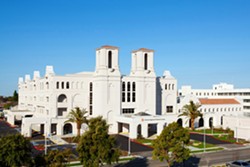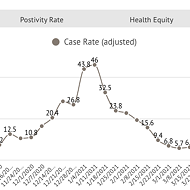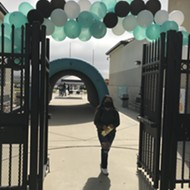Monday, April 27, 2020
COVID-19 antibody testing is coming to Dignity Health
Posted By Malea Martin on Mon, Apr 27, 2020 at 6:24 PM
While there isn’t a vaccine for COVID-19 yet, the idea of utilizing the human body’s natural disease fighting responses in order to treat patients is still a possibility, according to Dr. Kevin Ferguson, Medical Director of Clinical Laboratory and Pathology Department at Dignity Health Laboratories, Central Coast Division North.
Vaccines use dead or weakened virus antigens in order to essentially trick our bodies into thinking we are fighting off an illness, a Live Science article explains. The body’s natural response to a viral infection is to create antibodies, which then prevent that person from becoming sick with the virus in the future. In other words, it creates immunity.
It may be many months before a COVID-19 vaccine is created and approved, but in the meantime, Ferguson said antibodies can still be used through an old technique: convalescent plasma treatment. Human plasma contains antibodies from viruses we’ve fought in the past, so the idea is that if you take plasma from a recovered COVID-19 patient and give that plasma to a still-sick patient, it might help the sick person fight off their virus.
“It’s not new: Using convalescent plasma has been tried in other illnesses for which we don’t have vaccines,” Ferguson said.
At this point, Ferguson said it’s still too early to fully understand the benefits of plasma treatment in COVID-19 patients: “It’s anecdotal.”
Nonetheless, early studies show some promising improvements from COVID-19 patients who received a plasma treatment, and Ferguson called the treatments “potentially life saving.”
What’s also still unknown—on the Central Coast and across the world—is how many of us have COVID-19 antibodies. The New York Times reported on April 23 that 1 in 5 New Yorkers may have had COVID-19, citing a random 3,000 person antibody test which found many people “who never knew they had been infected had already encountered the virus, and survived.”
With 473 confirmed positive cases (322 of which have recovered) and 7 deaths as of April 27, Santa Barbara County’s infections are rising every day, making this type of testing all the more important in assessing the true community spread of the virus.
At the Santa Barbara County Public Health Department’s April 27 virtual press conference, Public Health Officer Dr. Henning Ansorg explained that the antibody test becomes positive once someone has recovered from infection.
“That takes weeks, anywhere from two to four weeks, for those antibodies to show in the blood test,” he said.
According to Ferguson, Marian Regional Medical Center recently got their test approved and can begin antibody testing locally. Like New York’s antibody testing, this new capability could be used “to estimate exposure in the community,” Ferguson said.
“It will be very interesting in the near future to see how many people had contact with this virus and it will give us very valid information about how far it has spread through the community,” Ansorg said of Marian’s new capabilities. “However, it is not a diagnostic test, so it is more a surveyance test to find out how many people did get in contact with this virus unknowingly.”
In the future, Ferguson said that antibody testing could also be used to identify potential plasma donors— but not yet. The science community doesn’t know enough yet about the potential for reinfection in people who have antibodies but never showed signs of the disease. Basically, just having antibodies isn’t yet enough to become a plasma donor.
“Currently we like to recruit donors who have been demonstrated to have had COVID by PCR,” Ferguson said, referring to the polymerase chain reaction (PCR) test used to identify a COVID-19 positive individual. “We typically take donations after their PCR becomes negative.”
Vitalant, a blood donation center in Santa Barbara, is where people who have recovered from COVID-19 can donate plasma. The role of hospitals in the donation process is to “help to identify donors by working with their primary care physicians,” Ferguson said. “Then if we find potential donors, we invite them back and assist with follow up testing as necessary to both confirm the diagnosis and then to determine when their PCR becomes negative.”
Cottage Hospital is following a similar model, announcing their partnership with Vitalant in an April 23 press release. The release stated that Vitalant’s requirements for plasma donation include “Prior diagnosis of COVID-19, documented by a laboratory test,” “Complete resolution of symptoms for at least 14 days,” and meeting “all other current FDA donor eligibility requirements to donate plasma.”
While Lompoc Valley Medical Center is not currently recruiting plasma donors, the hospital’s CEO Steve Popkin said via email that “If we need plasma for COVID-19 or other purposes, we get it from Vitalant, our blood products supplier.”
As for antibody testing, Popkin wrote that the Lompoc hospital expects to have onsite COVID-19 antibody testing capabilities some time in May.
“At this time, however, we have the ability to do send-out antibody laboratory testing, which reportedly has better sensitivity than the rapid turnaround type of test,” he said.
Typically, Ferguson said, plasma can be donated every 28 days.
“But they’ve shortened that in some cases, given the shortages of plasma, and they’ve allowed people to donate in some cases after seven days,” he said. ∆
Vaccines use dead or weakened virus antigens in order to essentially trick our bodies into thinking we are fighting off an illness, a Live Science article explains. The body’s natural response to a viral infection is to create antibodies, which then prevent that person from becoming sick with the virus in the future. In other words, it creates immunity.
It may be many months before a COVID-19 vaccine is created and approved, but in the meantime, Ferguson said antibodies can still be used through an old technique: convalescent plasma treatment. Human plasma contains antibodies from viruses we’ve fought in the past, so the idea is that if you take plasma from a recovered COVID-19 patient and give that plasma to a still-sick patient, it might help the sick person fight off their virus.
“It’s not new: Using convalescent plasma has been tried in other illnesses for which we don’t have vaccines,” Ferguson said.
At this point, Ferguson said it’s still too early to fully understand the benefits of plasma treatment in COVID-19 patients: “It’s anecdotal.”
Nonetheless, early studies show some promising improvements from COVID-19 patients who received a plasma treatment, and Ferguson called the treatments “potentially life saving.”
What’s also still unknown—on the Central Coast and across the world—is how many of us have COVID-19 antibodies. The New York Times reported on April 23 that 1 in 5 New Yorkers may have had COVID-19, citing a random 3,000 person antibody test which found many people “who never knew they had been infected had already encountered the virus, and survived.”
With 473 confirmed positive cases (322 of which have recovered) and 7 deaths as of April 27, Santa Barbara County’s infections are rising every day, making this type of testing all the more important in assessing the true community spread of the virus.
At the Santa Barbara County Public Health Department’s April 27 virtual press conference, Public Health Officer Dr. Henning Ansorg explained that the antibody test becomes positive once someone has recovered from infection.
“That takes weeks, anywhere from two to four weeks, for those antibodies to show in the blood test,” he said.
According to Ferguson, Marian Regional Medical Center recently got their test approved and can begin antibody testing locally. Like New York’s antibody testing, this new capability could be used “to estimate exposure in the community,” Ferguson said.
“It will be very interesting in the near future to see how many people had contact with this virus and it will give us very valid information about how far it has spread through the community,” Ansorg said of Marian’s new capabilities. “However, it is not a diagnostic test, so it is more a surveyance test to find out how many people did get in contact with this virus unknowingly.”
In the future, Ferguson said that antibody testing could also be used to identify potential plasma donors— but not yet. The science community doesn’t know enough yet about the potential for reinfection in people who have antibodies but never showed signs of the disease. Basically, just having antibodies isn’t yet enough to become a plasma donor.
“Currently we like to recruit donors who have been demonstrated to have had COVID by PCR,” Ferguson said, referring to the polymerase chain reaction (PCR) test used to identify a COVID-19 positive individual. “We typically take donations after their PCR becomes negative.”
Vitalant, a blood donation center in Santa Barbara, is where people who have recovered from COVID-19 can donate plasma. The role of hospitals in the donation process is to “help to identify donors by working with their primary care physicians,” Ferguson said. “Then if we find potential donors, we invite them back and assist with follow up testing as necessary to both confirm the diagnosis and then to determine when their PCR becomes negative.”
Cottage Hospital is following a similar model, announcing their partnership with Vitalant in an April 23 press release. The release stated that Vitalant’s requirements for plasma donation include “Prior diagnosis of COVID-19, documented by a laboratory test,” “Complete resolution of symptoms for at least 14 days,” and meeting “all other current FDA donor eligibility requirements to donate plasma.”
While Lompoc Valley Medical Center is not currently recruiting plasma donors, the hospital’s CEO Steve Popkin said via email that “If we need plasma for COVID-19 or other purposes, we get it from Vitalant, our blood products supplier.”
As for antibody testing, Popkin wrote that the Lompoc hospital expects to have onsite COVID-19 antibody testing capabilities some time in May.
“At this time, however, we have the ability to do send-out antibody laboratory testing, which reportedly has better sensitivity than the rapid turnaround type of test,” he said.
Typically, Ferguson said, plasma can be donated every 28 days.
“But they’ve shortened that in some cases, given the shortages of plasma, and they’ve allowed people to donate in some cases after seven days,” he said. ∆
—Malea Martin







 2023 Pet Photo Contest Winners
2023 Pet Photo Contest Winners
